In one hour, the energy supplied to the earth by the sun is enough to cater to the world’s energy needs for a whole year. It’s, therefore, not surprising that technology is evolving to harness this power. Our article today covers the solar power advantages and disadvantages you should consider before installing a solar panel. Understanding them will help you make a more informed decision on whether or not solar power is a workable solution for you.
Benefits Of Solar Energy To The Environment
1. It Can Help Reduce Your Electric Bill
A well-known advantage of installing a solar panel is that it helps you cut down on your energy consumption from the grid, thereby, saving you good money.
Currently, in the United States, many states demand net metering from utilities. This is beneficial for homeowners as it means that they can use the energy produced by their solar panels to offset their electricity bills.
Depending on where you live, you can save more than a thousand dollars in electricity costs just by installing a solar panel. In fact, in California, people who go solar can save about $99,000 all through the life span of their solar installation.
Solar panels last between 25 to 30 years on average.
2. It Insures You From Increments In Power Costs
In the past 10 years, the cost of electricity has steadily increased by about $0.2 each year and it continues to rise. Solar power can save you from the effects of increasing electricity prices since you’re basically generating your energy yourself.
In fact, rising electricity costs might be great news for you thanks to net metering since you’d essentially be selling the excess energy generated from your solar installation back to the grid.
3. Solar Power Will Get Cheaper
As electricity prices increase, the cost of solar power continues to fall.
In the past ten years, prices for installing solar power have dropped by over 70%. This has made solar power increasingly accessible to the average homeowner.
In addition, these days, there are incentives you can take advantage of to make solar installation costs even cheaper. For instance, installing a solar panel on or before the 31st of December 2020 can get you a 26% federal tax credit.
This tax credit, which is applied to your income tax, is valued at 26% of your total installation cost. And this is only one incentive out of several.
4. Solar Power Is Eco Friendly
Another big solar power benefit is that it is renewable. You can’t deplete the sun’s power by harnessing its energy. It’s also safe because it does not emit greenhouse gases.
5. It Literally Puts Power In Your Hands
With solar panels, you create your own energy which means you don’t have to depend on the grid. This gives you control. However, this advantage can be scaled to a much larger degree.
If the whole country were to go solar, for instance, we’d no longer have to depend on other countries for coal, oil, or gas. Now, this prospect is not just great for our economy, it’s also great for our security.
Solar Power Disadvantages
1. Upfront Cost Is High
This is perhaps the biggest solar power disadvantage right now. Running on solar currently costs the average American about $19,000. Of course, this figure will vary across the country and according to the incentives for which you qualify. However, generally, the cost is substantial.
Thankfully, there are solar financing plans that can help manage these costs.
2. Solar Energy Is Intermittent
The intermittency of solar energy is a result of three factors.
- The sun only shines during the day.
- Sunlight intensity is not constant.
- Environmental factors like foliage, snow, and cloud can affect how much energy a solar panel produces.
In the past, these factors made solar power completely unreliable. However, thanks to technological advancement, we have improved power storage with better batteries. These batteries are a cost-effective way to store up energy for the rainy day, no pun intended.
As research continues to improve, the issue of intermittency with solar power would soon become a problem of the past.
3. Manufacturing A Solar Panel Is Not Exactly Environmentally Friendly
Solar panels do generate clean energy. Nonetheless, the manufacture of the panels themselves has some impact on our environment as these panels could contain sulfur hexafluoride.
4. Solar Panels Take Up Space
For residential buildings, space is not a problem. However, when you go large scale, space for installation will most likely be a problem. This is because solar panels have a low power density especially in comparison to fossil fuels. Consequently, they need more space to generate sufficient energy.
Fossil fuels, on the other hand, do not require as much space because they are power-dense. But then again, mining coal destroys large acres of land while solar plants do not.
5. Solar Power Is Not On-The-Go
You can’t just pick up your solar panel and move. Uninstalling and reinstalling solar panels are expensive. Plus, net metering isn’t transferable.
On the bright side, though, homes with solar panels do have higher resale value. So, should you decide to move and sell your house, you can get more for it.
Quick tip. If you plan to move out of your house in the future, it’s better to buy your solar panels rather than lease or do a power purchase agreement (PPA). The latter options might create a hassle when it’s time to transfer it to the new owner.
Now that we’ve addressed the solar power advantages and disadvantages, it’s time to weigh both and find out whether it’s worth the investment.
How Practical Is Solar Energy?
For many, going solar would indeed be a smart financial choice but it won’t be the same for everyone. Some will only reap marginal financial rewards. And for others, the altruistic motivation to leave a smaller footprint on the ecosystem is enough. Find out if solar is right for you!








